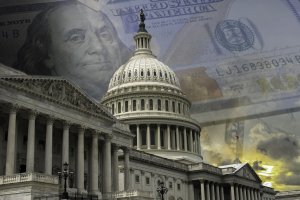Promoters plugged crypto as the key to accelerating Black America’s path to prosperity. It was going to level the playing field once and for all. The world of cryptocurrency was painted as a welcoming place for Black investors leery of traditional finance, a golden opportunity to build wealth and achieve financial empowerment. There was lots of talk of big returns, and few warnings of risks. Exuberance took hold.
But when markets began to crumble, Black people were left holding the bag. Many investors who came in after 2020 are now underwater; some have said goodbye to their life savings. Last in, hardest hit.
This, alas, is nothing new. As economist Peter Temin explores in disheartening detail in his recent book, Never Together: Black and White People in the Postwar Economic Era, Black Americans have operated from the get-go in an entirely different economy from whites. When they’ve tried to get ahead, they’ve been terrorized, cheated, discriminated against, redlined, saddled with debt, exploited, blocked from starting businesses, prevented from owning land, and relegated to the lowest-paying jobs. Inequitable policies and structures have been in place since colonial times, and we are still living in “colonial Virginia writ large,” as Temin describes it.
Wealth has never been distributed evenly. Neither has the pain when things go belly up.
That’s just what happened in 2022 when the crypto market blew up catastrophically. Instead of bringing them into the economy, crypto put Black communities at risk. Rather than helping them close the wealth gap, it overexposed them to scam and fraud.
In an age when calls for racial justice are on the lips of so many, and barely a decade after the mortgage debacle of 2008, which disproportionately walloped Black families and communities, how could we allow this to happen again? The beginning is always a very good place to start.
Birth of a Dream
The dream of crypto followed the nightmare of the 2007–2008 financial crisis when people lost trust in the global financial system and the government. A form of currency that needs no government backing, beyond the reach of regulators and central bankers, was sold as the first step to a fairer and happier future. For everybody except bankers, of course, who were bailed out.
Hunger for new currencies during anxious times is not novel. During the Great Depression, all kinds of paper and tokens were circulated as currency, even things as weird as clam shells and rabbit tails. In 2009, Bitcoin was launched by a mysterious developer (or developers) known by the pseudonym Satoshi Nakamoto. First, it was a cult, then a fad, and soon enough, a movement.
A shimmering promise of a coming golden age.
Bitcoin shot up in value after the 2013 financial crisis in Cyprus scared people with bank savings, who faced a one-off levy as part of a eurozone bailout. A currency free from government raids was suddenly extra-enticing.
Libertarians swooned. Tech bros called Bitcoin the beacon of a new alternative tender movement. It was all about clever, future-focused people coming together to give the finger to big banks and the government. We don’t need you!
A whole industry ignited. As peer-to-peer currency took off, new altcoins with delightfully absurd names started popping up everywhere: Dogecoin (after the Shiba Inu dog); Whoppercoin (in homage to Burger King); Potcoin (favored by the marijuana industry); Polkadot (what could be more fun?); and Ethereum (named for ‘the hypothetical invisible medium that permeates the universe and allows light to travel’).
Financially naïve Millennials led the charge. All of a sudden, those slips of paper decorated with Masonic symbols in your pocket seemed embarrassingly retro. The mysterious wonkery of crypto was fed into mainstream consciousness by celebrity endorsements, starting with the photogenic Winklevoss twins, famed for suing their Harvard classmate Mark Zuckerberg for stealing their social media idea.
It was quite a party. Who wouldn’t want to join?
What They Didn’t Tell You
If you can easily afford to lose everything you put in, crypto isn’t a problem. Just like at the blackjack table.
For everyone else, the problem is that the idea of a safe, stable currency minus government is a libertarian fantasy. Here’s why: Everyday money in modern states is paper, with its status guaranteed by governments (set gold aside — there’s never enough of it and it’s hard to carry around). By law, it must be accepted for the discharge of debts and payment of taxes.
Governments in the modern world also stand behind major banks, whose deposits are money. But absent this structure of support, most money becomes purely a conventional item, and if conventions change, it’s worth… exactly nothing.
Can you buy anything with a clamshell today? Unlikely. Who really has to accept crypto today, or tomorrow? Nobody, although if you’d like to invest in a Ponzi scheme, they’re currently taking it.
If you get scammed or robbed in Cryptoland, who do you go to? You didn’t want the government involved, so what’s your recourse? There isn’t any.
Many have derided crypto itself as a Ponzi scheme, like computer scientist Nicholas Weaver of the University of California at Berkely, who put it this way: “Cryptocurrency is a self-assembled Ponzi scheme made up of Ponzi schemes, stock frauds, and other financial scams.” Others compare it to early American wildcat banking, where banks issued their own notes with minimal regulation.
Some view crypto as little more than trendy speculation – i.e., the type of financial transaction that has a substantial risk of losing all value, like the infamous Tulip Mania of the 17th century. Only with Tulip Mania, at least you got a bulb. Crypto is not even a useful object.
Another problem with cryptocurrency is regulation, which is detested by many crypto enthusiasts in love with the idea of decentralization. At the moment, regulation is a stinking hot mess, pretty much the “Wild West,” as current SEC chair Gary Gensler described it.
Crypto Invades Black America
You might think of crypto as mainly the purview of young white tech bros. But you’d be wrong. Black investors had more invested in cryptocurrencies than their white counterparts when the markets exploded. Because they came in at or near the most recent peak, many of those investors lost more than whites.
A lot couldn’t afford it. As the New School’s Darrick Hamilton has explained, racial economic disparity in America has persisted in large part because of the grinding obstacles Black Americans face in building generational wealth. This makes them much more vulnerable to economic shocks.
In the early days of crypto, Black investors were wary. But when Bitcoin and other digital assets started to surge in value, they went in, enticed by promises that this was the way to bypass a traditional financial system that many never trusted. Phrases like “financial inclusion” and “economic empowerment” were balm to old wounds.
Hype was in the air. In 2015, the movie “Dope” featured a group of Black teenagers who use Bitcoin to thwart a financial criminal. Black celebs tantalized newbie investors, like actor Jamie Foxx, who jumped in as an early celebrity crypto endorser and promoted the token sale of Cobinhood, a free cryptocurrency trading exchange (which recently shut down for a month and just axed real-time customer service). Boxing legend Mike Tyson declared himself “all in” with cryptocurrency Solana (which recently cratered), while rapper 50 Cent and football player Cade Cunningham “joined the Bitcoin revolution,” asking for payment in crypto.
The products were marketed as the antidote to racial inequality. It was accessible – you didn’t need a bank account or a great credit history to invest. Sinclair Skinner, a celeb of the Afro-tech world and co-founder of BitMari, the “largest Pan-African Bitcoin wallet provider,” linked traditional banks to the slave trade and proclaimed that Black people could finally take control of their finances with crypto. “Instead of waiting for politicians to change our communities, we think we can use the technology to create that change and build wealth within the global Black community,” he said.
Kim Kardashian got crypto fever. 32% of Black Americans trusted the pop culture legend in financial matters (compared to 19% of all adults), according to a Morning Consult poll. (Kardashian will now pay $1.26 million in a crypto-related fine to the SEC). The same poll also found that Black adults were more likely than other groups to say they’d invest in crypto based on an endorsement from a celebrity or influencer.
Politicians of color got in on the action, like Miami mayor Francis Suarez, who pushed the cryptocurrency Miami Coin (worth essentially nothing today), vowing to make his city the “crypto capital.” (The FTX Arena, home to the Miami Heat, just had to change its name in a hurry). Meanwhile, New York mayor Eric Adams, another early devotee, aimed to make his city crypto ground zero and opted to have his first three paychecks paid in cryptocurrency – just before the Bitcoin crash. He has called crypto “the future of commerce” and remains bullish today. (But he’s not taking his paycheck in crypto anymore).
As the coronavirus spread through Black communities in 2020 and 2021, the crypto-virus spread with it. Promoters said it was a prudent financial investment, a hedge against inflation. Black content creators were gaining increased visibility during this time, and the momentum for racial justice was growing, heightening the appeal of race-related marketing.
In 2021, hip-hop billionaire Jay-Z, the ultimate entertainer-turned-entrepreneur, bought an NFT (a digital product built using the same kind of programming as cryptocurrency) called CryptoPunk and made it his Twitter profile picture. He even launched “Bitcoin Academy” at the Brooklyn housing project where he grew up, styling it as a series of free “financial literacy” courses to be taught by Black internet sensation Lamar Wilson, who runs the website Black Bitcoin Billionaire. (Residents were not amused: as one woman put it, “People looking to make money, not lose it”).
In a 2022 Superbowl ad for Crypto.com, basketball superstar LeBron James gave advice to his younger self: “If you want to make history, you gotta call your own shots.” It was all about independence, Black power. Crypto was the name of the game.
The result of the hype-tsunami? According to a Pew Research Poll, by 2021, 18% of Black Americans were invested in, traded, or used crypto, compared to only 13% of whites. Many were investors who had shied away from traditional stocks. By April 2022, an Ariel and Charles Schwab survey of 2,000 Americans found that 25% of Black investors owned cryptocurrency, compared to 15% of white investors.
Darrick Hamilton, long skeptical of the crypto craze, feared that a crash was coming and that it was going to clobber Black investors and communities. As he told me, “It’s low entry and it’s targeted to Black investors. And it’s like a casino, where Black people also get hit harder.”
Dreams Die Hard
2022 was the year the new nightmare set in. Hot went cold in what came to be known as the “crypto winter.” The Fed was raising interest rates, causing investors to feel bearish. Many pulled back on crypto. Prices began to fall, and then things really got ugly. High-profile companies started going bust, bringing the price of digital currencies into freefall.
First, it was terraUSD, an “algorithmic stablecoin” pegged to the U.S. dollar which turned out to be anything but stable. It tanked so spectacularly that people compared it to the Lehman collapse of 2008. That, in turn, set off the bankruptcy of Three Arrows Capital, a hedge fund exposed to the coin. And it went on from there.
In November, FTX, a heavily-used cryptocurrency exchange, crashed faster than you could say “fraud alert,” sending billions of dollars up in smoke. Investors watched in horror as 30-year-old crypto king Sam Bankman-Fried, founder of FTX and crypto hedge fund Alameda Research — and one of the planet’s richest men — was indicted on eight criminal charges including wire fraud, conspiracy by misusing customer funds, and violation of campaign-finance laws. He’s now under house arrest at the home of his parents, where he plays video games.
Today, the price of a single bitcoin has plummeted from a peak of more than $68,000 in November 2021 to about a third of that. Cryptocurrencies as a whole lost more than $2 trillion in paper value.
And it’s not over yet. The crypto lending firm Genesis has just filed for bankruptcy – another multi-billion dollar blowup. Among those exposed? Pension funds. Though, not economist Larry Summers, former U.S. secretary of the treasury, who quietly exited from DCG, which owned a big share of Genesis, some weeks ago.
Crypto was and remains a cesspool of fraud. Hackers can steal it. Studies indicate that insider trading on exchanges is rife. A dirty trick called “wash trading” artificially pumps up asset prices and draws in novice investors. (Up to 70% of transactions on unregulated crypto exchanges are reported to stink of this practice). Then there’s the “rug pull,” which is what happens when a crypto development team hypes a coin and then suddenly grabs the liquidity and high-tails it out the door.
As an inexperienced investor, how can you tell fraud from fact? Hype from reality? You can’t. Plenty of seasoned investors have been fooled. Billionaire Peter Thiel, a man quite convinced of his own genius, drank the Kool-aid, rhapsodizing that crypto holds out “the prospect of a decentralized and individualized world.” Then he reportedly choked on FTX, though he more recently claimed to have gotten out early.
There’s no clear way forward, which means that for now, your protection as an investor is basically nil, and market stability is impossible.
In the U.S., regulatory attention has been, let us say, somewhat lackluster. True, President Biden signed off on some new crypto legislation related to taxes in the $1.2 trillion bipartisan infrastructure bill late in 2021. But did that do anything to curb the catastrophe that unfolded in 2022? It did not.
The legal framework for crypto regulation is clear as mud. Is crypto a commodity or a security? Should it be under the supervision of the SEC or the CFTC? Both? Also unclear, but if it’s a commodity, as many crypto champions claim, it’s mainly overseen by the CFTC, which is far more lenient than the SEC. Dennis Kelleher of Better Markets just reacted to the CFTC’s announced regulatory agenda related to crypto. His conclusion? Its supervision is “AWOL” and the agency is a “cheerleader for the industry.” Robbin Wigglesworth of the Financial Times called the CFTC “a friendly champion of a fraud-riddled dumpster fire it purportedly wants to supervise.”
In 2023 crypto’s structural problems remain in place, but many Black investors are still in the game. Asset prices have risen a bit, and crypto miners and speculators are getting excited again.
Congress and the SEC continue to investigate what changes may be needed, but they haven’t made much headway. Recently, the U.S. government exerted some pressure on crypto crimes by cracking down on Bitzlato, a Russian cryptocurrency exchange, for cross-border money laundering. So congrats on that. Over in Congress, Patrick McHenry (R-NC), the incoming chair of the Financial Services Committee, is creating a subcommittee on digital markets to be led by French Hill (R-AR).
But don’t expect the wheels of regulation to move quickly. This prediction is related to the fact, as Politico has reported, that crypto-funded super PACs forked over millions in the midterms to insure that politicians of both parties would do regulation their way (Crypto Innovation PAC, a GOP-focused group, spent $167,000 on Patrick McHenry).
CoinDesk reveals that one in three members of Congress took money from Sam Bankman-Fried and other former FTX executives. INET research by Thomas Ferguson, Paul Jorgensen, and Jie Chen shows that the mountain of cash SBF and his associates dropped on Democrats and Republicans alike was even bigger than the media have reported, “over $89 million dollars since 2019, with the bulk of it coming during the 2021-22 political cycle when the campaign to keep crypto clear of federal regulation swung into high gear.”
Meanwhile, America’s road to racial economic inequality is getting even rockier.
A recent NPR/Robert Wood Johnson Foundation/Harvard T.H. Chan School of Public Health poll indicates that during the period covered (May 16 – June 13, 2022), 55% of Black Americans reported having serious financial problems, compared to only 38% of whites. Black respondents were more likely to say they lacked adequate emergency savings or food and feared evictions.
In December 2022, the Federal Open Market Committee (FOMC) and the Board of Governors of the Federal Reserve System held meetings to discuss the U.S. economic outlook, the minutes of which contained an ominous view of America’s workforce. As reported, “a number of participants commented that as the labor market moved into better balance, the unemployment rate for some demographic groups—particularly African Americans and Hispanics—would likely increase by more than the national average.” In other words, the Fed knows that its actions to curb inflation will disproportionately hit people of color.
Does anything in this picture suggest that America is committed to the promise of prosperity for all? Black Americans need ways to create economic security, but politicians on both sides are now talking about cutting Social Security and Medicare. They need to build wealth, but the key to doing so, obtaining a first-rate, affordable education, is next to impossible for many. (According to the National College Attainment Network, less than a quarter of public universities and colleges are considered affordable). Investors need protection against the predations at a time when even an august institution like Fidelity is allowed to push crypto on workers trying to save for retirement.
Crypto is really just a fever dream of casino capitalism – ironically one born of fears about that very system. Calls to leap into the future digital world sound all the more enticing when things in the present real world are stacked against vulnerable people – not just Black Americans, but basically everyone who isn’t rich. Until things get better here and now, dangerous future-fantastical illusions like crypto will continue to thrive.







